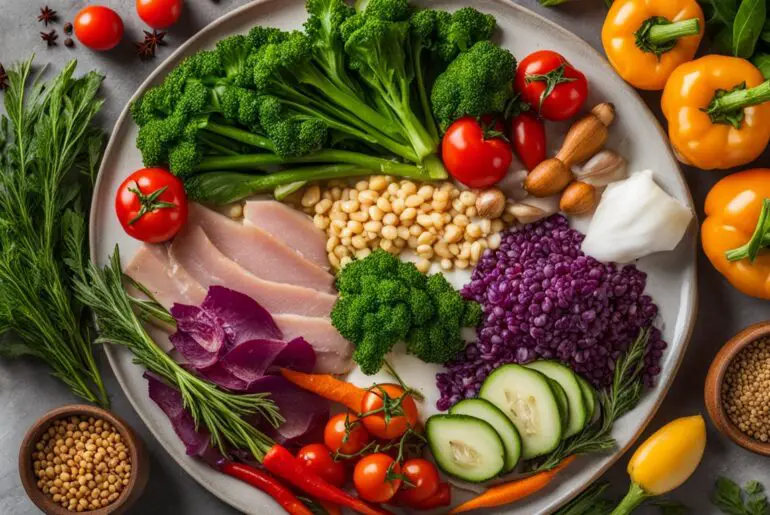Did you know that maintaining weight after completing the HCG diet can be a challenging task for many individuals? While the HCG injections and strict 500-800 calorie diet during the program ensure rapid weight loss, once the injections stop, the body can go into a frenzy fat-storing mode, leading to weight gain. But don’t worry, there are strategies you can implement to maintain your weight loss and achieve your ideal weight after the HCG diet.
What Should I Do to Maintain the Weight After HCG Diet?
To maintain weight after the HCG diet, it is essential to gradually increase calorie intake rather than making abrupt changes. Starting with an increase of 200 calories per day in the first week and gradually reaching the recommended daily intake of 1500 calories is recommended. Reintroducing sugars and starchy foods slowly into the diet, while keeping everything in moderation, can help the body adjust.
Formulating an exercise routine is also crucial for post-HCG weight maintenance. Incorporating at least 75 minutes of vigorous exercise or 150 minutes of moderate exercise per week can help in maintaining weight loss achieved through the HCG diet.
By gradually increasing calorie intake, reintroducing certain foods, and engaging in regular physical activity, individuals can successfully maintain their weight after completing the HCG diet phase.
The Importance of Exercise in Weight Maintenance After HCG Diet
Exercise plays a vital role in maintaining weight loss after the HCG diet. During the diet phase, strenuous exercise is not recommended, but after completing the diet and increasing calorie intake, regular physical activity is necessary. Engaging in exercise after the HCG diet helps to prevent weight regain and promotes overall health and well-being.
The key to successful weight maintenance through exercise is consistency. The importance of post-HCG diet exercise lies in its ability to boost metabolism, burn calories, increase muscle mass, and improve cardiovascular fitness.
There are various exercise options to choose from based on personal preference and lifestyle. Activities such as cardiovascular exercises (e.g., running, cycling, swimming), strength training, brisk walking, Zumba, and yoga all contribute to maintaining weight loss after the HCG diet. The focus should be on finding a routine that is enjoyable and sustainable in the long run.
Tips for Incorporating Exercise After the HCG Diet
- Start gradually: Begin with low-impact exercises and gradually increase the intensity and duration over time.
- Set realistic goals: Establish achievable exercise goals that align with your fitness level and schedule.
- Combine different exercises: Incorporate a combination of cardiovascular exercises and strength training for optimal results.
- Find a workout buddy: Working out with a partner or joining group fitness classes can provide motivation and accountability.
- Make it enjoyable: Choose activities that you enjoy and look forward to, making exercise a positive and rewarding experience.
Remember, maintaining weight loss through exercise is just as important as adhering to a healthy diet. By incorporating regular physical activity into your post-HCG diet routine, you can increase your chances of successfully maintaining your weight loss and enjoying a healthier lifestyle in the long term.
| Benefits of Exercise after HCG Diet | Recommended Duration |
|---|---|
| Boosts metabolism | At least 75 minutes of vigorous exercise or 150 minutes of moderate exercise per week |
| Burns calories | Regular exercise sessions lasting 30-60 minutes |
| Increases muscle mass | Strength training exercises 2-3 times per week, targeting major muscle groups |
| Improves cardiovascular fitness | Cardiovascular exercises such as running, cycling, or swimming |
Gradually Transitioning to a Normal Diet Routine After HCG Diet

After completing the HCG diet, the next step is to gradually transition back to a normal diet routine. This process involves reintroducing sugars and starchy foods slowly, starting with low-carb and low-fat options. By doing so, you can help your body adjust to a wider variety of foods while still maintaining the weight loss achieved during the HCG diet.
It is important to monitor your weight during this transition period and make adjustments if necessary. Your body may take up to nine weeks for a complete metabolism reset, so it’s important to be patient and make minor changes to your diet while giving your body time to adjust.
Reintroducing Foods after HCG Diet
As you begin to reintroduce sugars and starchy foods into your diet, it’s important to do so in a controlled manner. Start by adding small amounts of these foods back into your meals while continuing to focus on low-carb and low-fat options. This gradual approach will allow your body to adapt to the increased calorie intake.
Here are some guidelines to follow:
- Start with small portions of whole grains like brown rice or quinoa.
- Include a variety of fruits and vegetables to ensure you’re getting essential nutrients.
- Add lean protein sources such as chicken, fish, or tofu to your meals.
- Choose healthy fats like avocados, nuts, and olive oil in moderation.
By reintroducing these foods gradually, you can help prevent any sudden weight gain and allow your body to adjust to the increase in calories.
Monitoring Weight and Making Adjustments
During the transition period, it’s crucial to monitor your weight closely. Keep track of any changes and make adjustments to your diet if needed. If you start to notice weight gain, consider reducing your portion sizes or cutting back on certain foods for a few weeks.
Remember, it can take time for your body to fully reset its metabolism after the HCG diet. Be patient with yourself and trust the process. Making minor adjustments while giving your body time to adjust will help you maintain your weight loss in the long run.
| Foods to Reintroduce Gradually | Portion Size | Frequency |
|---|---|---|
| Sugars and sweeteners | Small amounts | Occasionally |
| Starchy foods (potatoes, bread, pasta) | Small portions | Gradually increase |
| Dairy products | In moderation | Occasionally |
| Processed foods | Limit intake | Occasionally |
By following these guidelines and gradually transitioning to a normal diet routine, you can continue to maintain your weight loss after the HCG diet. Remember to listen to your body, be mindful of portion sizes, and make adjustments when necessary. With time and consistency, you can achieve your long-term weight maintenance goals.
Determining the Optimal Caloric Intake After HCG Diet
Calculating the ideal calorie intake after completing the HCG diet is essential for maintaining weight loss. By determining the optimal number of calories, individuals can avoid weight gain while still meeting their nutritional needs.
To calculate the post-HCG calorie goals, a simple formula can be used. Multiply your current weight by 13 to determine the daily calorie intake. For example, if someone weighs 130 pounds, they should aim for consuming around 1690 calories per day to maintain their weight.
Using this figure as a benchmark, individuals can gradually increase their calorie intake after the HCG diet. It is important to do this incrementally, allowing the body to adjust to higher calorie levels without triggering weight gain. By gradually increasing calorie intake until reaching the calculated number, individuals can find the optimal balance for maintaining weight loss.
A well-balanced diet that includes a variety of nutrient-dense foods is essential for post-HCG maintenance. This includes consuming lean proteins, whole grains, fruits, vegetables, and healthy fats.
Remember that everyone’s calorie needs may vary based on factors such as activity level, metabolism, and individual body composition. Consulting with a healthcare professional or registered dietitian can provide personalized guidance on determining the optimal calorie intake for your specific needs.
Sample Table for Calculating Post-HCG Calorie Goals
| Weight (in pounds) | Optimal Calorie Intake |
|---|---|
| 120 | 1560 |
| 140 | 1820 |
| 160 | 2080 |
| 180 | 2340 |
| 200 | 2600 |
This table provides a general idea of the optimal calorie intake based on weight. Using this as a starting point, individuals can adjust their calorie goals according to their specific needs and goals after consulting with a healthcare professional or registered dietitian.
By determining the optimal calorie intake after the HCG diet and gradually increasing calorie goals, individuals can effectively maintain their weight loss and achieve long-term success.
Reintroducing Foods and Monitoring Weight After HCG Diet

After completing the HCG diet, it is important to reintroduce foods slowly and monitor weight closely. By starting with low-carb and low-fat options while keeping everything in moderation, the body can adjust more effectively. This approach allows for a gradual transition and helps minimize the risk of weight regain.
Reintroducing foods after HCG involves incorporating a variety of healthy options back into your diet. It is advisable to focus on nutrient-rich foods such as fruits, vegetables, lean proteins, and whole grains. These choices provide essential vitamins, minerals, and fiber while keeping calorie intake in check.
Monitoring weight after HCG is crucial for staying on track with your maintenance goals. Weigh yourself regularly, ideally once a week, to keep tabs on any changes. If weight gain occurs, don’t panic. Instead, evaluate your eating habits and make adjustments where needed. Consider cutting back on portion sizes or reducing the intake of high-calorie foods for a few weeks to get back on track.
HCG diet maintenance guidelines suggest that patience is key during this phase. It usually takes up to nine weeks for a complete metabolism reset and stabilization. Minor adjustments and a consistent approach are necessary during this time. Remember, sustainable weight loss is achieved through a gradual process, and your commitment to healthy habits will pay off in the long run.
“Following the HCG diet is a remarkable achievement, and maintaining your weight afterward requires a thoughtful approach. By reintroducing foods gradually and closely monitoring weight, you can create a sustainable lifestyle that supports your health and well-being.”
– Dr. Sarah Thompson, Registered Dietitian
| Food Group | Suggested Reintroduction |
|---|---|
| Fruits and Vegetables | Add a variety of fresh fruits and non-starchy vegetables to your meals. |
| Proteins | Incorporate lean proteins such as chicken, fish, tofu, or beans into your diet. |
| Whole Grains | Introduce whole grains like quinoa, brown rice, or whole wheat bread in moderation. |
| Dairy | Gradually reintroduce low-fat dairy products like Greek yogurt or skim milk. |
| Fats and Oils | Use healthy fats like avocado, olive oil, or nuts sparingly in your meals. |
| Treats and Indulgences | Enjoy occasional treats and indulgences in moderation, paying attention to portion sizes. |
Reintroducing foods after the HCG diet should be done mindfully, focusing on nourishing your body with wholesome choices. As you navigate this phase, remember to listen to your body, eat intuitively, and make gradual adjustments based on how you feel and your weight trends. By following these guidelines, you can achieve a successful and sustainable transition into the maintenance phase of your weight loss journey.
Creating a Sustainable Exercise Routine After HCG Diet
After completing the HCG diet, it is crucial to create a sustainable exercise routine to maintain weight loss. Incorporating regular physical activity not only aids in preserving your hard-earned progress but also promotes overall health and well-being.
To develop a sustainable exercise routine, start by committing to three days of exercise per week. This frequency provides a good balance between challenging your body and allowing for adequate rest and recovery. Gradually increase the number of exercise days as you build stamina and endurance. Aim for a more regular schedule that includes a variety of activities to prevent monotony and engage different muscle groups.
When designing your exercise routine, consider incorporating a mix of cardio, resistance training, and flexibility exercises. Including a combination of high-intensity intervals and longer-duration moderate exercises can maximize calorie burning and improve cardiovascular fitness. Resistance training, such as weightlifting or bodyweight exercises, helps build lean muscle mass, which boosts metabolism and contributes to long-term weight management. Including flexibility exercises, such as yoga or stretching, can enhance mobility and prevent injuries.
Here are some exercise options to consider:
- Cardiovascular exercises: Running, cycling, swimming, or dancing
- Resistance training: Weightlifting, bodyweight exercises, or using resistance bands
- Flexibility exercises: Yoga, Pilates, or stretching routines
Consistency is key when it comes to maintaining weight loss through exercise. Find activities you enjoy and that align with your lifestyle, making them more likely to become sustainable habits. Prioritize a routine that is realistic and manageable for you. Remember, the goal is to create a lifelong exercise routine that supports your weight maintenance efforts.
Regular physical activity not only helps in preventing weight regain but also offers numerous other health benefits, including improved mood, increased energy levels, and reduced risk of chronic diseases.
By incorporating a sustainable exercise routine into your post-HCG diet maintenance plan, you can continue to enjoy the benefits of weight loss while promoting a healthier and more active lifestyle.
Clinical Assistance for HCG Diet Maintenance
For those looking for clinical guidance and professional support in maintaining their weight after completing the HCG diet, medically supervised HCG programs are available. These programs offer comprehensive assistance in setting calorie goals, designing exercise routines, and providing ongoing support to ensure long-term weight maintenance and success. It is essential to choose authorized clinics with the proper accreditation to ensure both safety and effectiveness.
Medically supervised HCG programs provide personalized and tailored approaches to weight management. With the support of a qualified healthcare professional, individuals can receive expert advice and guidance in navigating the challenges of post-HCG diet maintenance. These programs take into account individual needs and circumstances, creating a customized plan that aligns with specific goals and targets.
One of the key advantages of opting for a medically supervised HCG program is the clinical expertise available to clients. Healthcare professionals can determine an individual’s optimal caloric intake, considering factors such as weight, metabolism, and activity level. By carefully monitoring progress and adjusting strategies as needed, clinical professionals help ensure the most effective and efficient weight management journey.
In addition to calorie goal setting, medically supervised HCG programs also provide guidance in creating exercise routines specifically tailored to each individual’s needs and preferences. These programs focus on developing a sustainable and enjoyable exercise routine that complements weight management efforts. By incorporating regular physical activity, individuals can further enhance their weight maintenance success and overall well-being.
“Medically supervised HCG programs offer clinical assistance in setting calorie goals, creating exercise routines, and providing ongoing support to ensure long-term weight maintenance.”
Choosing a medically supervised HCG program can provide the necessary structure, guidance, and accountability to successfully maintain weight loss after the HCG diet. By working with healthcare professionals, individuals can feel confident in their approach, knowing that they have expert support throughout their journey. These programs go beyond mere recommendations by offering clinical assistance, education, and ongoing monitoring to ensure long-term success in maintaining weight loss after completing the HCG diet.
The Benefits of Medically Supervised HCG Programs
When considering clinical assistance for HCG maintenance, it is important to understand the benefits that medically supervised HCG programs offer. These advantages include:
- Personalized guidance and support from qualified healthcare professionals.
- Expertise in setting optimal calorie goals based on individual needs and circumstances.
- Customized exercise routines designed to enhance weight management efforts.
- Ongoing monitoring and support to ensure long-term success.
- Access to a comprehensive range of resources and educational materials.
- A structured and accountable approach to weight management.
By harnessing these benefits, individuals can optimize their chances of maintaining weight loss after completing the HCG diet. Medically supervised HCG programs offer a holistic and evidence-based approach to weight management, empowering individuals to achieve their long-term goals and experience lasting results.
Clinical Assistance for HCG Diet Maintenance – Choosing the Right Program
When seeking clinical assistance for HCG maintenance, it is crucial to choose the right program. Here are some factors to consider:
- Accreditation: Ensure that the program is operated by accredited healthcare professionals and authorized clinics.
- Expertise: Look for programs that have proven experience in HCG diet maintenance and weight management.
- Support: Evaluate the level of ongoing support and counseling provided by the program.
- Personalization: Seek programs that offer individualized plans and strategies based on specific needs and goals.
- Comprehensiveness: Consider programs that offer a range of services beyond calorie goal setting, including exercise guidance, education, and monitoring.
By carefully assessing and choosing the right medically supervised HCG program, individuals can embark on their weight maintenance journey with confidence, knowing they have the necessary clinical assistance and support at every step.
| Benefits of Medically Supervised HCG Programs | Choosing the Right Program for HCG Diet Maintenance |
|---|---|
| Personalized guidance and support from qualified healthcare professionals | Accreditation: Ensure that the program is operated by accredited healthcare professionals and authorized clinics. |
| Expertise in setting optimal calorie goals based on individual needs and circumstances | Expertise: Look for programs that have proven experience in HCG diet maintenance and weight management. |
| Customized exercise routines designed to enhance weight management efforts | Support: Evaluate the level of ongoing support and counseling provided by the program. |
| Ongoing monitoring and support to ensure long-term success | Personalization: Seek programs that offer individualized plans and strategies based on specific needs and goals. |
| Access to a comprehensive range of resources and educational materials | Comprehensiveness: Consider programs that offer a range of services beyond calorie goal setting, including exercise guidance, education, and monitoring. |
| A structured and accountable approach to weight management |
“By choosing the right medically supervised HCG program, individuals can embark on their weight maintenance journey with confidence, knowing they have the necessary clinical assistance and support at every step.”
Conclusion
Maintaining weight loss after the HCG diet requires a gradual increase in calorie intake, a return to a normal diet routine, regular exercise, and close monitoring of weight. By gradually reintroducing foods and making minor adjustments while giving the body time to reset its metabolism, individuals can prevent weight regain and achieve long-term success. Incorporating sustainable exercise routines and seeking clinical assistance through medically supervised HCG programs can provide professional support and guidance in maintaining weight loss.
With commitment and dedication to these post-HCG diet strategies, individuals can maintain their ideal weight and improve their overall health and well-being. It’s important to remember that weight maintenance is a lifelong journey, and small, consistent efforts have the greatest impact. By adopting these strategies, individuals can not only achieve their weight loss goals but also have a better chance of sustaining their success in the long run. Maintaining a healthy lifestyle is key to enjoying the benefits of weight loss and leading a fulfilling life.
FAQ
What Should I Do to Maintain the Weight After HCG Diet?
To maintain weight after the HCG diet, it is essential to gradually increase calorie intake rather than making abrupt changes. Starting with an increase of 200 calories per day in the first week and gradually reaching the recommended daily intake of 1500 calories is recommended. Reintroducing sugars and starchy foods slowly into the diet, while keeping everything in moderation, can help the body adjust. Formulating an exercise routine is also crucial, with a recommendation of at least 75 minutes of vigorous exercise or 150 minutes of moderate exercise per week.
What Is the Importance of Exercise in Weight Maintenance After HCG Diet?
Exercise plays a vital role in maintaining weight loss after the HCG diet. During the diet phase, strenuous exercise is not recommended, but after completing the diet and increasing calorie intake, regular physical activity is necessary. At least 75 minutes of vigorous exercise or 150 minutes of moderate exercise per week is advised. Activities such as cardio, resistance training, brisk walking, biking, or Zumba can be chosen based on personal preference and lifestyle, but regular exercise is crucial to prevent weight regain.
How Should I Gradually Transition to a Normal Diet Routine After HCG Diet?
After completing the HCG diet, it is important to gradually transition back to a normal diet routine. This involves reintroducing sugars and starchy foods slowly, starting with low-carb and low-fat options. It is essential to monitor weight during this period and make adjustments if necessary. The body may take up to nine weeks for a complete metabolism reset, so patience is key in making minor changes while giving the body time to adjust.
How Can I Determine the Optimal Caloric Intake After HCG Diet?
The optimal number of calories that can be safely consumed without risking weight gain can be calculated by multiplying current weight by 13. For example, if someone weighs 130 pounds, they can consume 1690 calories per day to maintain their weight. Using this figure as a benchmark, gradually increasing calorie intake after the HCG diet until reaching the calculated number can help in maintaining weight loss.
How Should I Reintroduce Foods and Monitor Weight After HCG Diet?
After completing the HCG diet, it is important to reintroduce foods slowly and monitor weight closely. Starting with low-carb and low-fat options while keeping everything in moderation can help the body adjust. If weight gain occurs, cutting back on the levels for a few weeks can be beneficial. It usually takes up to nine weeks for a complete metabolism reset, so minor adjustments and patience are necessary during this period.
How Can I Create a Sustainable Exercise Routine After HCG Diet?
After completing the HCG diet, it is crucial to create a sustainable exercise routine to maintain weight loss. Starting with three days of exercise per week and gradually increasing to a more regular schedule can help in preventing weight regain. Activities such as cardio, resistance training, brisk walking, biking, or Zumba are recommended. Consistency and regular physical activity are key to maintaining weight loss.
Can I Get Clinical Assistance for HCG Diet Maintenance?
For those seeking professional guidance and support in maintaining their weight after the HCG diet, there are medically supervised HCG programs available. These programs offer clinical assistance in setting calorie goals, creating exercise routines, and providing ongoing support to ensure long-term weight maintenance. It is important to choose authorized clinics with proper accreditation to ensure safety and effectiveness.
What Are the Key Strategies for Maintaining Weight After HCG Diet?
Maintaining weight loss after the HCG diet requires a gradual increase in calorie intake, a return to a normal diet routine, regular exercise, and close monitoring of weight. Reintroducing foods slowly and making minor adjustments while giving the body time to reset its metabolism is crucial. Seeking clinical assistance through medically supervised HCG programs can provide professional support and guidance in maintaining long-term weight loss. With commitment and dedication, individuals can achieve their ideal weight after completing the HCG diet.




